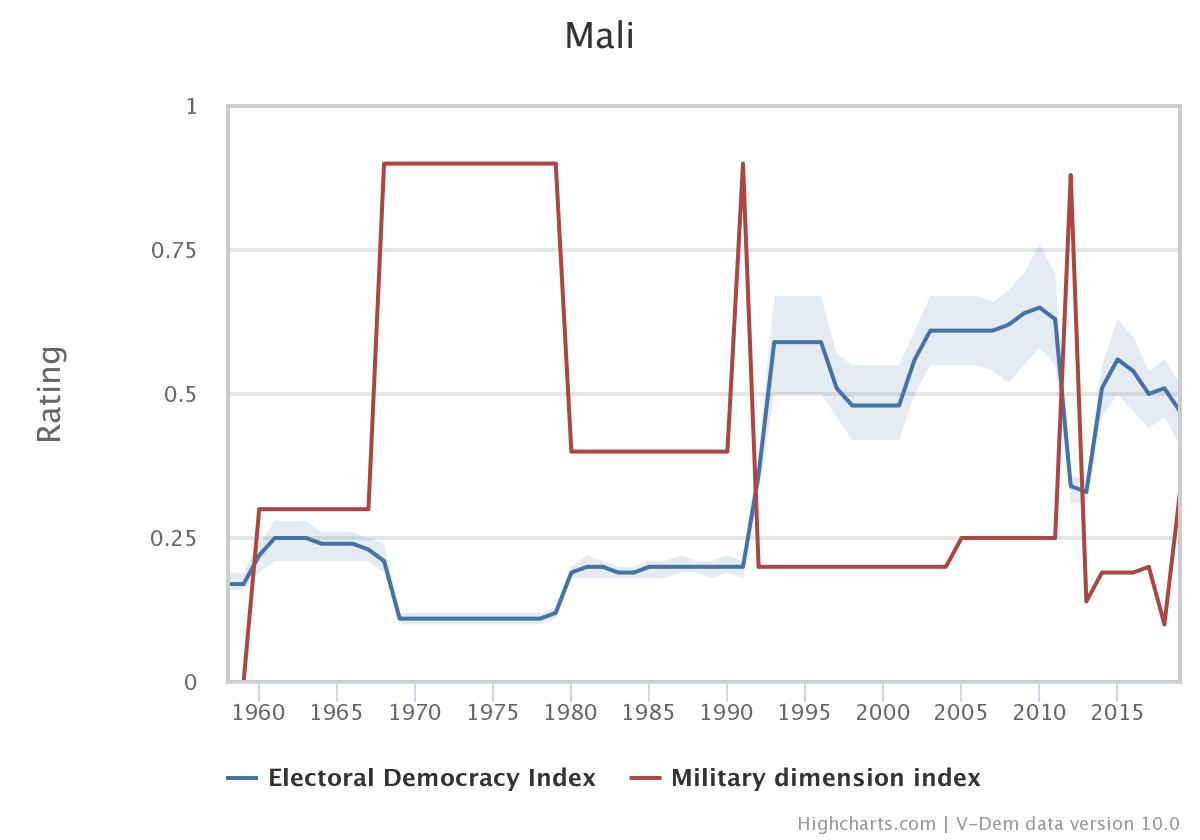Mali: Where Does This Most Recent Coup Lead To?
By: Paul Bederke
Sep 02, 2020
After two months of protests over corruption, economic issues and terrorism, parts of the Malian Armed Forces launched a coup d’état on 18 August and detained incumbent President Keïta and other government officials. In negotiations with representatives of the Economic Community of West African States (ECOWAS), the military announced its intention to hold new elections after an as yet unknown transition period. It was the fourth military coup since Mali gained independence in 1960.
Today, we use two variables from the larger V-Dem dataset to see how previous military coups affected Mali’s quality of democracy. The Military dimension index measures to what extent the military determines the chief executive's power base, i.e., to which extent the appointment and dismissal of the chief executive are based on the threat or actual use of military force. The Electoral Democracy Index (EDI) measures to what extent the ideal of electoral democracy is achieved. It is an essential element of representative democracy and includes among other things free and fair elections, freedom of expression and an independent media.
The first coup took place in 1969, leading to the toppling of socialist President Modibo Keïta. Leader of the putschists, Moussa Traoré, became the next authoritarian President. In the 1979 Malian general election, the first election since the coup, Traoré was the only candidate for the sole-legal Democratic Union of the Malian People Party minimizing the military’s influence. During the authoritarian ruling of Keïta and Traoré, the EDI is at a low level. In 1991, the second military coup took place and Lieutenant Colonel Touré led the so-called Transitional Committee for the Salvation of the People to run the country temporarily until a civilian government has been restored. This coup paved the way for multiparty elections the following year, as reflected in the sharp improvement in the Electoral Democracy Index. Touré himself, 2002 elected and 2007 re-elected as President of Mali, was forced out of office during a coup in 2012. Soldiers rebelled because they disapproved of the President's handling of the armed conflicts in northern Mali. The newly formed National Committee for the Restoration of Democracy and State stated that they wanted to ensure national security and were not interested in political power. However, the instability resulting from the coup led to several cities being overrun by militant rebels and the government lost control over northern Mali. New elections were held in 2013 and the recently deposed Ibrahim Boubacar Keïta became President. The decline in the EDI in 2012 and 2013 was reversed but has shown a downward trend since then.
In summary, military coups in Mali have led to different results over the last 50 years. On the one hand, multiparty elections were held following the 1991 intervention, and on the other hand, the country plunged into civil war in 2012. After the previous two coups, elections were held the following year, but this does not appear to have been decided yet.
To learn more about V-Dem indicators and our online analysis tools, visit v-dem.net.


